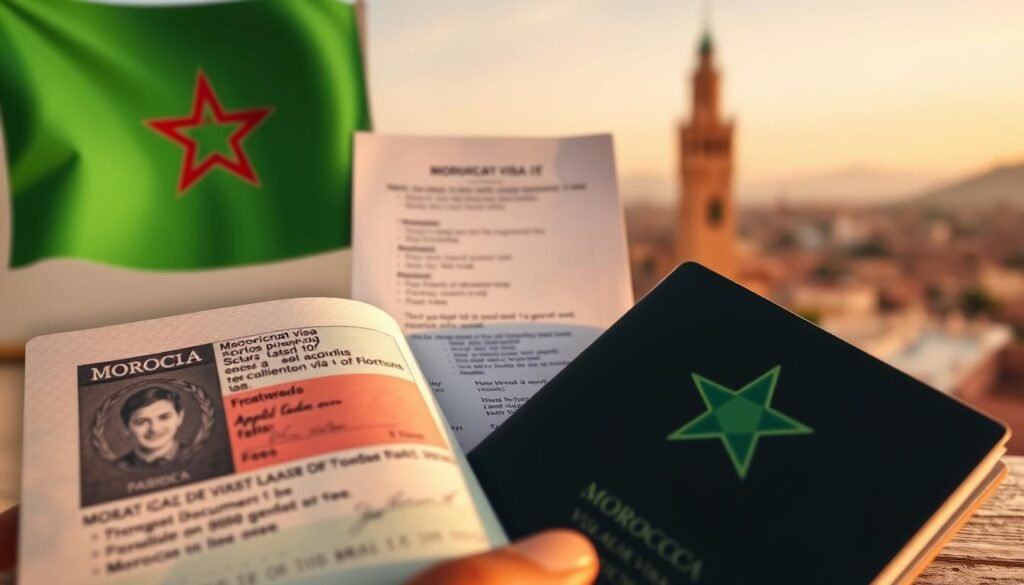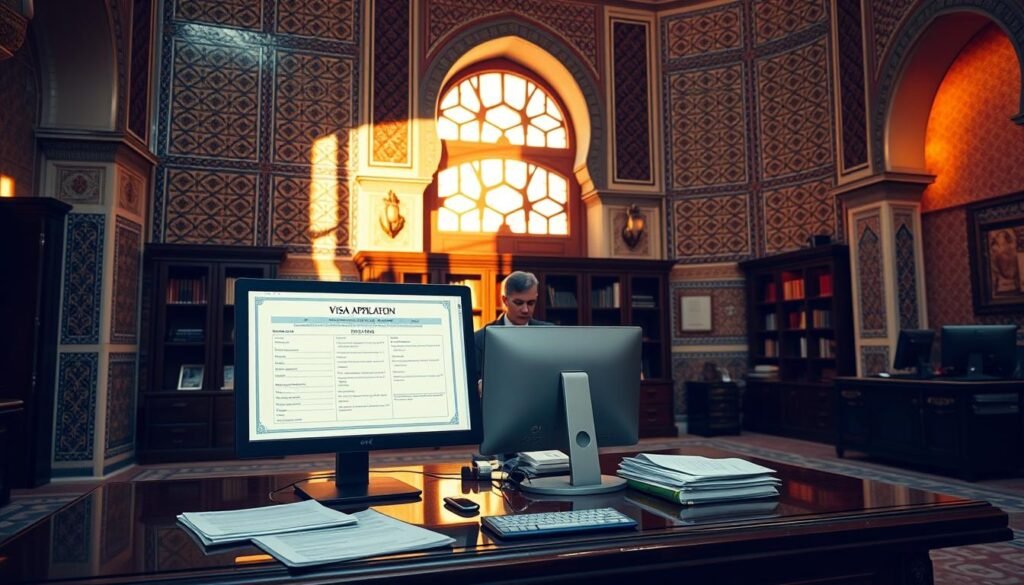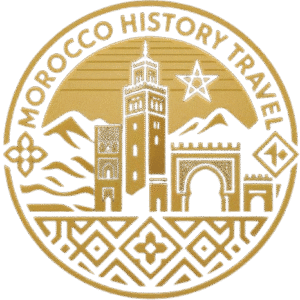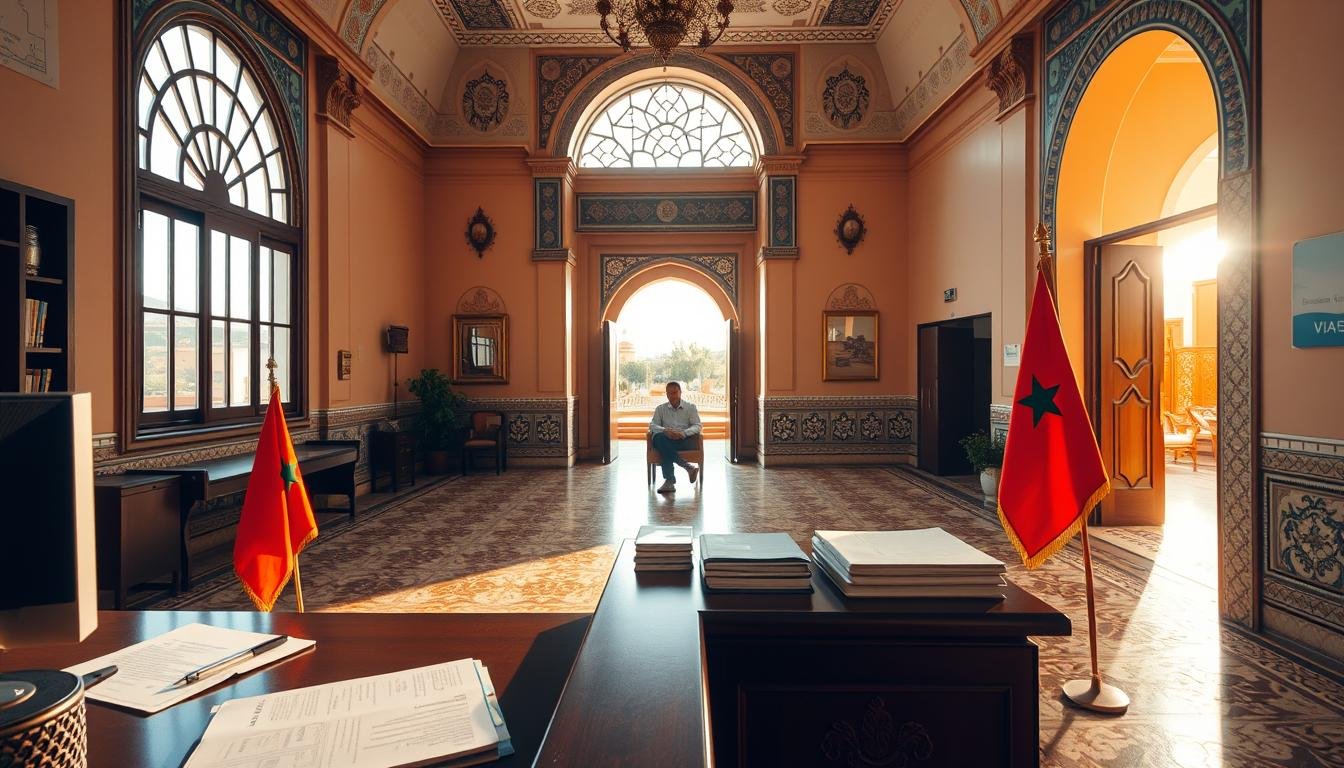Morocco’s Visa and Entry Formalities
Planning a trip to Morocco? It’s key to know the Morocco visa application process for a smooth trip. You might wonder if you need a visa to enter Morocco. The good news is that Morocco lets in travelers from several countries without a visa.
These countries include the United States, Canada, the European Union, Australia, and most Gulf Cooperation Council (GCC) countries.
If you’re from one of these countries, you can enjoy your trip without a visa. But, it’s important to know the traveling to Morocco visa rules for your nationality. Learning about the types of visas and the Morocco visa application process will prepare you for your trip.
Key Takeaways
- Morocco offers visa-free entry to citizens of several countries.
- Check if your country is eligible for visa-free travel.
- Understand the different types of visas available.
- Research the Morocco visa application process.
- Plan ahead to ensure a smooth journey.
Understanding Morocco’s Visa Policy
Planning a trip to Morocco? Knowing the visa policy is key. Morocco’s rules aim to make travel easy while keeping the country safe.
Countries Exempt from Visa Requirements
Some countries don’t need a visa for Morocco. This includes places like Europe, the Americas, and more. If you’re from one of these places, you’re good to go for up to 90 days.
Duration of Stay for Visa-Free Visitors
Visa-free visitors can stay up to 90 days in 180 days. It’s important to track your time to avoid trouble with immigration.
Recent Policy Updates for 2023-2024
Morocco has updated its visa policy. The new rules make applying for a visa easier and add more security. They’ve also introduced an electronic visa system and changed the list of countries that don’t need a visa.
| Country | Visa Exemption | Max Stay |
|---|---|---|
| USA | Yes | 90 days |
| Canada | Yes | 90 days |
| UK | Yes | 90 days |
Visa Requirements and Entry Formalities for Morocco
To make your entry into Morocco easy, know the visa needs and entry steps. Knowing these will help you get your documents ready and avoid problems at the border.
Essential Documentation Checklist
For a Moroccan visa, you’ll need a few important things. These are a valid passport, a filled-out application form, and passport photos. You’ll also need proof of where you’ll stay, your travel plans, and enough money to cover your stay.
Passport Validity Requirements
Your passport must be good for at least six months after you plan to leave Morocco. This rule makes sure you can legally stay in the country for your visit.
Proof of Accommodation and Return Tickets
You might need to show where you’ll stay, like hotel bookings or a host’s letter. Also, having a return ticket or travel plans shows you plan to leave.
Financial Sufficiency Evidence
You must show you can afford to live during your visit. This could be bank statements, traveler’s checks, or other financial papers.
By getting these documents ready and knowing what you need, you’ll have a smooth entry into Morocco. You can then enjoy your trip without any hassle.
Types of Moroccan Visas Available
Morocco has different visas for various traveler needs. Whether you’re on vacation, a business trip, or an academic program, knowing your visa options is key. This ensures a smooth entry into Morocco.
Tourist Visas and Their Limitations
Tourist visas are for those wanting to see Morocco’s culture and history. These visas limit how long you can stay, usually from 30 to 90 days. “Tourism is a big part of Morocco’s economy,” says a travel expert. “The government has made the visa process easier for visitors.”
It’s important to check the visa requirements and how long it’s valid for your country.
Business Visas and Required Supporting Documents
Business visas are for professionals doing business in Morocco. You’ll need to provide documents like a letter from a Moroccan company, proof of your business, and financial proof. Make sure your documents are current and meet embassy standards.
Student Visas for Academic Programs
Students going to Moroccan schools need a student visa. You’ll need to submit a letter from your school, proof of money, and sometimes a health certificate. Start your application early to avoid delays.
Work Permits and Residency Visas
For work in Morocco, you need a work permit and a residency visa. The process is complex, needing employer sponsorship and many documents. Talking to the Moroccan consulate or an immigration expert can help with the requirements.
Morocco Visa Requirements for US Citizens
Planning a trip to Morocco as a US citizen? Knowing the visa rules is key for a smooth visit. Morocco has clear rules for US travelers, so it’s important to know before you go.
90-Day Visa Exemption Details
US citizens don’t need a visa for stays up to 90 days. This rule lets you visit Morocco for fun or business without a visa, as long as you stay less than 90 days in 180 days. Make sure your passport is good for at least six months after you leave Morocco.

Requirements for Stays Beyond 90 Days
For stays longer than 90 days, you’ll need a visa. The visa type depends on your reason for staying, like work or study. Apply for the right visa before your exemption ends.
Special Considerations for American Travelers
American visitors need to show proof of where they’ll stay, enough money, and a return ticket. Morocco also suggests registering with local authorities if you’ll be in one place for a while.
US-Morocco Travel Agreements
The US and Morocco have travel deals to make visiting easier. These deals cover visa-free travel for short trips and help fight illegal immigration. Knowing about these agreements can help US citizens understand the entry process better.
Step-by-Step Morocco Visa Application Process
To travel to Morocco, you’ll need to go through the visa application process. It’s designed to be easy and straightforward. You’ll need to follow a few key steps to make sure your application goes smoothly.
Completing the Application Form Correctly
The first thing to do is fill out the application form right. Make sure all your details match your passport. Double-checking your application for mistakes is very important to avoid delays.
Gathering and Organizing Supporting Documents
Next, you need to gather all the required documents. These include a valid passport, proof of where you’ll stay, return tickets, and proof you can afford your trip. Organize these documents carefully so you have everything you need.
Submission Methods and Processing Timeline
After you have everything ready, you’ll need to submit your application. You can do this online or in person at a Moroccan consulate. The time it takes to process your application can vary, so apply early.
Visa Fees and Accepted Payment Methods
You’ll also need to pay the visa fees. Check what payment methods are accepted, as they can differ. Keep a record of your payment for your records.
By following these steps and making sure your application is complete and correct, you can easily apply for a Morocco visa. This careful approach will help you have a successful application and get ready for your trip to Morocco.
Applying Through Moroccan Consulates in the US
To get a Moroccan visa, US travelers must go through the application process at a Moroccan consulate in the US. This process is easy to follow. It helps applicants get the visa they need for their trip.

Consulate Locations and Jurisdictions
Moroccan consulates are found in key locations across the US. The main ones are in New York, Washington D.C., and Los Angeles. Knowing which consulate covers your area is important. It tells you where to apply.
How to Schedule an Appointment
Scheduling an appointment is a key step. You can book your appointment on the Moroccan consulate’s official website. Pick a date and time that gives you enough time for processing before your trip.
In-Person Application Procedures
When you apply in person, you’ll need to bring all needed documents. This includes a valid passport, proof of where you’ll stay, and proof you can afford your trip. The consulate staff will help make sure your application is right.
Mail-in Application Guidelines
If you can’t apply in person, you can apply by mail. Send your application and documents to the consulate. Use a trackable shipping method. Make sure all documents are well-packed to avoid loss or damage.
Morocco Visa on Arrival Options
Morocco has a visa on arrival for some countries. This makes it easier for visitors to enter. It lets them enjoy their trip without stress.
Eligibility for Visa on Arrival
Some nationalities can get a visa on arrival at Moroccan airports. To qualify, you need a valid passport, proof of where you’ll stay, and enough money for your trip.
Procedures at Major Airports
At major Moroccan airports, eligible travelers go to the visa counter. They must show their passport, proof of where they’ll stay, and enough money.
Documentation Required Upon Arrival
Travelers for a visa on arrival need to bring:
- A valid passport with at least six months’ validity
- Proof of accommodation (hotel reservation or similar)
- Evidence of financial sufficiency (bank statement or credit cards)
- A return or onward ticket
Emergency and Special Circumstance Provisions
If there’s an emergency, contact the Moroccan consulate or embassy. They can help with visa applications or other needs.
| Document | Description | Requirement |
|---|---|---|
| Passport | Valid for at least six months | Mandatory |
| Proof of Accommodation | Hotel reservation or similar | Mandatory |
| Financial Sufficiency | Bank statement or credit cards | Mandatory |
Entry Procedures at Moroccan Borders
Arriving in Morocco by air, land, or sea is easy if you know the entry procedures. Morocco has many entry points, like airports, land borders, and seaports. Each has its own steps to make your entry smooth.
Step-by-Step Airport Immigration Process
At a Moroccan airport, the immigration process is simple. First, show your passport, which must be valid for six months after your stay. If you need a visa on arrival, fill out a form and provide documents like accommodation proof and funds. After submitting your application and paying the fee, you’ll go through immigration control.
Navigating Land Border Crossings
Entering Morocco by land means stopping at the border. Bring a valid passport and any needed visas. You might need to show proof of travel plans and where you’ll stay. Also, declare any goods you’re bringing, as customs rules apply here too.
Maritime Entry Points Procedures
Arriving by sea, you’ll go to ports like the Port of Casablanca. After getting off the boat, head to immigration and customs. Show your passport, visa (if needed), and any customs forms. Have all your documents ready to speed up the process.
Customs Regulations and Required Declarations
Every entry method has customs rules to follow. You must declare items like gifts, purchases, and some restricted goods. Not declaring correctly can lead to fines or losing your items. Knowing what’s allowed and restricted before your trip helps avoid problems at entry.
Extending Your Stay in Morocco
Wondering how to stay longer in Morocco? Extending your visa is easy if you know the steps.
When and Where to Apply for Extensions
Apply for a visa extension at your local police station or commissariat. Make sure to do it before your visa ends to avoid trouble.
Required Documentation for Visa Extensions
You’ll need valid reasons for your extension, like tourism or health issues. Also, bring a valid passport, proof of money, and a recent photo.
Processing Times and Fees
Getting a visa extension takes a few days to weeks. You’ll also have to pay a fee, which varies based on your visa type and extension length.
Dealing with Overstays and Possible Penalties
Overstaying can lead to fines and penalties. If you’ve overstayed, contact the authorities and follow their procedures to fix it.
By understanding the visa extension process and following Morocco’s visa policy updates and tourist visa rules, you can have a smooth extended stay in Morocco.
Special Entry Considerations
As you get ready for your Moroccan trip, learn about special entry rules. Knowing these will make your entry smooth.
Traveling with Children and Required Documentation
Traveling with kids? You’ll need the right papers. This includes a valid passport for each child and birth certificates. You might also need a letter from the other parent if you’re traveling alone or with one parent.
For US citizens, the process is easy. It follows Morocco visa requirements for US citizens. Make sure all your documents are current and valid for at least six months after you leave Morocco.
Entry Procedures with Pets
Bringing your pet? Morocco has rules for pets. You’ll need an import permit and proof your pet is microchipped and vaccinated against rabies. Also, check your airline’s pet travel rules.
Medical and Vaccination Requirements
Morocco needs certain vaccinations, like for yellow fever. Talk to your doctor or a travel clinic to see what shots you need.
Current COVID-19 Related Entry Protocols
COVID-19 rules can change. Morocco has eased many restrictions, but check travel advisories. You might need to show vaccination proof or a negative test.
Entry with Restricted Items
Some items are not allowed in Morocco, like narcotics, weapons, and certain media. Know these restrictions to avoid problems when you arrive.
| Category | Requirements | Additional Notes |
|---|---|---|
| Traveling with Children | Valid passport, birth certificate | Letter of authorization if necessary |
| Traveling with Pets | Import permit, microchip, rabies vaccination | Check with airline for pet travel policies |
| Medical/Vaccination | Yellow fever vaccination if required | Consult healthcare provider or travel clinic |
By following these special entry rules, you’ll have a smooth entry into Morocco. Enjoy your trip!
Conclusion: Ensuring a Smooth Entry to Morocco
Planning your trip to Morocco? Knowing the visa application process is key for a smooth journey. By following Morocco’s visa and entry rules, you’ll have a hassle-free entry.
Visa needs change based on your country and visit purpose. Learning about the morocco visa application process early can save you time and trouble.
Preparing all needed documents and following the guidelines is vital. This makes navigating Morocco’s entry process easy.
Being well-prepared lets you enjoy Morocco’s culture and stunning landscapes. Morocco has a lot to offer, and you’ll be ready to explore it all.

